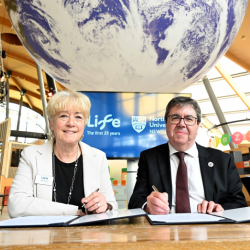Satellites observe glacier committing “ice piracy”
A glacier in Antarctica is committing “ice piracy” – stealing ice from a neighbour – in a phenomenon…
International
Northumbria’s global footprint touches every continent across the world, through our global partnerships across 17 institutions in 10 countries, to our 277,000 strong alumni community and 150 recruitment partners – we prepare our students for the challenges of tomorrow. Discover more about how to join Northumbria’s global family or our partnerships.
View our Global FootprintBusiness
The world is changing faster than ever before. The future is there to be won by organisations who find ways to turn today's possibilities into tomorrows competitive edge. In a connected world, collaboration can be the key to success.
More on our Business ServicesResearch
Northumbria is a research-rich, business-focused, professional university with a global reputation for academic quality. We conduct ground-breaking research that is responsive to the science & technology, health & well being, economic and social and arts & cultural needs for the communities
Discover more about our ResearchAlumni
Northumbria University is renowned for the calibre of its business-ready graduates. Our alumni network has over 246,000 graduates based in 178 countries worldwide in a range of sectors, our alumni are making a real impact on the world.
Our Alumni/404 cannot be found.
Please use the form below to report the broken link.

A glacier in Antarctica is committing “ice piracy” – stealing ice from a neighbour – in a phenomenon…

A new project to strengthen collaboration between universities and businesses and others to…

Public policy experts at Northumbria University, whose research focuses on welfare reform as…

The team behind a circular economy initiative aimed at tackling plastic pollution, which includes…

Northumbria University and North East Museums are teaming up to present Small Pipes – Big History,…

Almost 80 per cent of UK adults support national security agencies collecting and processing…

Northumbria University and the International Centre for Life (Life) have agreed a new strategic…

Great Hall, Sutherland Building
-
City Campus East CCE1 - 003
-

Lecture Theatre 002
-

The Great Hall
-
Back to top